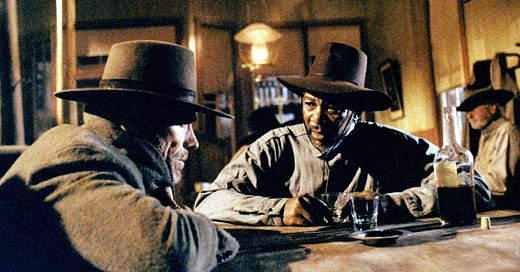‘Crypto is gambling’, say UK MPs
Crypto regulatory spat, Health survey data questioned, UK parliamentary lobby group quits, Massachusetts sets its own regulatory path +More
Good morning. On today’s agenda:
Influential UK Treasury Committee MPs say regulate crypto as gambling.
The UK Health Survey results should have been good news for the sector.
Meanwhile, the UK gambling sector loses its voice in parliament.
The Massachusetts Gaming Commission charts its own course.
Feral warned over skins exchange.
‘Crypto is gambling’
The influential UK Treasury Select Committee sent cryptoland into meltdown after calling for unbacked digital currencies such as Bitcoin and Ethereum to be regulated as gambling.
There will be blood: A report by the cross-party group of MPs pulled no punches, airing a ‘Wild West’ analogy in painting the crypto sector as a wretched hive of scum and villainy frequented by con artists, money launderers and thieves.
“With no intrinsic value, huge price volatility and no discernible social good, consumer trading of cryptocurrencies, like Bitcoin, more closely resembles gambling than a financial service, and should be regulated as such,” said committee chair Harriett Baldwin.
Regulators around the world are formulating positions in response to the frequent controversy that stems from the sector.
In the past year, huge exchanges and crypto trading firms have collapsed, billions have been wiped from the value of tokens and the number of scams traced to crypto has skyrocketed.
Unforgiven: Prime Minister Rishi Sunak’s view has yet to be made public, but the report calls into question his ambition to turn the UK into a global crypto hub. His government recently laid out plans to wrap crypto into the existing sphere of financial services laws by tweaking legislation to account for the new kinds of tradable assets.
The committee said that would merely create a ‘halo’ effect which fooled consumers into thinking that pumping cash into unbacked tokens based on cartoon dogs, cartoon frogs and Homer Simpson is safe and protected.
MPs also drew clear and critical parallels between Sunak’s enthusiasm for non-fungible tokens (NFTs) and his public backing of crypto-assets.
Given the benefits are at this stage unclear, it advised ministers to “avoid spending public resources on projects without a clear, beneficial use, as appears to have been the case with its now-abandoned Royal Mint NFT”.
“It is not the government’s role to promote particular technological innovations for their own sake,” the committee said.
Good, bad & ugly: Very few voices came out in support of the proposals, with most stating the intervention from the panel was at best “misguided” and at worst unrepeatable in a family newsletter.
“We are both concerned and disappointed by these claims, which are unhelpful, false, fundamentally flawed and unsubstantiated,” said Ian Taylor, board advisor at lobby group CryptoUK.
The government previously compared crypto to gambling in a 2018 report, in which it again drew parallels to the Western era of Dodge City, Tombstone and Wyatt Earp.
“Unfortunately, this report shows little understanding of the sector, and it is doubtful that treating consumer transactions within the sector as gambling will provide consumer protection – this approach is at odds with reality,” said Dion Seymour, crypto technical director at tax advisers Andersen LLP.
“Going by this rationale I need to have a hard conversation with my eight-year-old stepson that he is likely to have a gambling problem,” added Ben Lee, partner at Andersen UK. “He’s lost a lot of money on Pokemon cards. And there are a lot of fakes on eBay.”
Dances with wolves (of Wall Street): Some also addressed the elephant in the room: the nature of bog-standard investments and trading.
“Based upon the report recommending that crypto trading be regulated as gambling and not a financial service, shouldn’t they then regulate stocks trading on AIM the same way?” asked Margaret Rosenfeld, chief legal officer of Cube Exchange crypto group.
C+M will take a deeper dive into the matter in the coming weeks, with exclusive analysis from crypto and betting industry experts.
** SPONSOR’S MESSAGE ** Tried, tested and proven over a decade in the highly-regulated US market, and continuing to expand across Europe, Latin America, Asia and Africa. GeoComply harnesses the power of its market-leading geolocation technology to protect against fraud, including fake account creations, bonus abuse, account takeovers, stolen identities, money laundering, and more. Visit geocomply.com.
NHS problem gambling survey
The first UK National Health Service (NHS) study in five years on gambling behavior slipped out quietly this week, with the numbers described as “distortive” and “a mess” by commentators.
Good news everyone! The survey was carried out in 2021 and various metrics show problem gambling rates down from their 2018 levels, appearing to be the lowest since records began in 1999.
Problem gambling prevalence as classified under certain criteria dropped from 0.38% of the UK population in 2018 to 0.25% in 2021.
Including those identified as ‘problem gamblers’, the rate was 0.36%, down from a 2018 rate of 0.55%.
Same, same but different: However, the NHS advised against comparing the findings with previous figures due to the hefty change in methodology and behavior caused by the pandemic lockdowns.
That didn’t cool the Betting and Gaming Council’s jets, however, with the lobby group stating: “This study is another reality check for anti-gambling prohibitionists who lobby tirelessly to campaign on the basis of a fallacy that problem gambling is some kind of public health emergency.”
Data from the NHS survey is currently referenced in the Customer Interaction Social Responsibility Code Provision for licensees.
“Unfortunately, the new data does not break problem gambling rates down per activity as the 2018 data does, which means the Commission is likely to continue referencing the information from 2018,” said Melanie Ellis, partner at Northridge Law.
Draw your own conclusions: While the release “appears to be good news for those wishing to see a reduction in harmful gambling”, what comes next is of much greater significance, said Dan Waugh of Regulus Partners.
The UK Gambling Commission (GC) is gearing to publish somewhere between eight and 11 different ‘problem gambling’ studies based on a raft of different methodologies this year as part of its post-White Paper bonanza.
It has made no official comment or reference to the NHS numbers.
“Of course, in the next couple of months we may see the GC replace these stats with its own (deeply flawed survey) showing problem gambling rates three to five times higher,” Waugh said. “This may have serious ramifications.”
The difference between a problem gambling rate of 0.5% and 1.5% is around 500,000 adults; enough to “tilt the balance in public policy considerations between personal freedom and state intervention”, he added.
APPG calls it quits
The official UK parliamentary grouping on gambling has pulled the plug following the lobbying scandal involving its former chair.
RIP: In a brief notice, the All Party Parliamentary Group on betting and gaming said it has pulled the shutters down a matter of weeks after the publication of the UK government’s Gambling Act Review White Paper.
The suspension of activities also follows in the wake of the lobbying scandal involving group chair Scott Benton, MP for Blackpool South, who was caught in a newspaper sting operation appearing to offer access to ministers in return for cash.
He was also filmed offering to table parliamentary questions and said he could send the newspaper’s fake investor access to the White Paper ahead of publication.
Fray Benton: Sources close to the APPG suggested the group’s work was always destined to be severely handicapped following the Benton scandal with vice-chair Aaron Bell, another Tory MP, resigning at the same time.
According to parliamentary rules, any APPG needs to have at least two officers from the governing party.
As it stands, only long-standing industry supporter Philip Davies is willing to put himself forward.
Counterweight: Steve Donoughue, the APPG’s secretariat, noted that since the emergence of the licensing of FOBTs became an issue, pro-gambling has become a “toxic” position. He noted that the group would now continue its work on an informal basis.
“I think there should be an APPG for the gambling industry, considering the number of anti-gambling groups within Parliament,” he added.
In opposition to the betting and gaming group, there is another APPG on gambling-related harm as well as the Peers for Gambling Reform.
Regulatory road to nowhere
The Massachusetts Gaming Commission has been one of, if not the most deliberative regulatory agencies in the arena. It has also shown a willingness to insert itself into conversations many consider beyond the scope of gaming regulators.
Solving problems that don’t exist: The latest example of this came on Tuesday when the MGC spent an inordinate amount of time debating whether it should mandate “21-Plus” on fixed images of sports-betting logos and trademarks in locations where it is likely to be viewed by persons under 21.
The conversation led RG consultant Jamie Salsburg to point out the potential for unintended consequences when non-experts jump into conversations.
“I appreciate the goal trying to be achieved here (reducing kids’ exposure to betting brands), but not sure placing 21+ beneath a logo has much impact on ‘getting people loyal when they're younger’,” he wrote on Twitter.
In a recent interview, the NCPG’s Keith Whyte specifically called out regulators, noting “odd responses” to issues experts have worked on for years.
“On the good side, there’s a lot more people talking about it. On the bad side, some of the people that are talking about responsible gambling have absolutely no idea what they’re doing.”
Or, as industry veteran Chris Grove asked when he caught wind of the 21+ discussion, “But… why?”
The MGC decided to put off a vote to receive more input (full coverage of the MGC meeting can be found here).
The race to the bottom: If the MGC operated in a vacuum, its policies would be a minor annoyance and have a trivial impact on the overall industry. That is not the case. Several US locales are engaged in a strange and wholly unnecessary game of one-upmanship.
The marketing crackdown you implemented, we can go further.
The fines you’re handing out, we can go higher.
And now, that silly policy you require, we can make it sillier.
What we’re reading
No win, no fee: Here’s what happens when you offer a risk-free bet to a regulatory lawyer.
Feral warning
Online operator Feral Holdings Limited has received a formal warning and its Counter Strike: Global Offensive Roll (CS:GO) website blocked from Australia after it was busted offering prohibited online casino games.
Offensive maneuver: The Australian Communications and Media Authority (ACMA) said CS:GO had breached the Interactive Gambling Act 2001.
CS:GO allowed users to deposit ‘skins’ from the popular video game Counter Strike: Global Offensive in exchange for in-game coins that could be used to gamble on casino-style games.
Winnings would then be paid out in the form of skins, which could be converted into cash using third-party platforms.
Gaming skins are used to change the look of virtual items or characters and can be won in video games or purchased via third-party websites.
ACMA chair Nerida O’Loughlin said gambling sites must follow Australian gambling laws, even if they use virtual items instead of traditional currency.
“Providing casino-style games online is prohibited in Australia when playing for money or something of value, whether that’s Australian dollars, cryptocurrency or, in this case, online gaming skins,” O’Loughlin said.
** SPONSOR’S MESSAGE** BettingJobs is the global leading recruitment solutions provider to the iGaming, Sports Betting and Lotteries sectors. Boasting a 20-year track record supporting the iGaming industry, and with a team of experts and world class knowledge, it’s no surprise BettingJobs is experiencing rapid growth with outstanding results. Does your company have plans to expand teams to cope with strong growth and demand?
Contact BettingJobs.com today where their dedicated team members will help you find exactly what you are looking for.
Sports integrity notebook
Ivan the terrible: Brentford and (very briefly) England striker Ivan Toney has received an eight-month ban from playing soccer after he accepted he had broken the FA rules on betting. Toney was also fined £50k.
The FA’s regulatory commission is yet to publish its findings but the charge sheet included 232 instances of rule-breaking.
The breaches took place between 25 February 2017 and 23 January 2021, during which time Toney represented Scunthorpe United, Wigan Athletic, Peterborough United and Brentford.
ASA notebook
The UK’s Advertising Standards Authority (ASA) has found sports-betting and iCasino operator Kwiff in breach of UK advertising rules, after it appeared next to a news article aimed at under-18s.
A story on the Portsmouth FC website encouraging children to sign up for its youth programme featured a Kwiff sign-up bonus promotion.
An +More Media publication.
For sponsorship inquiries email scott@andmore.media.










